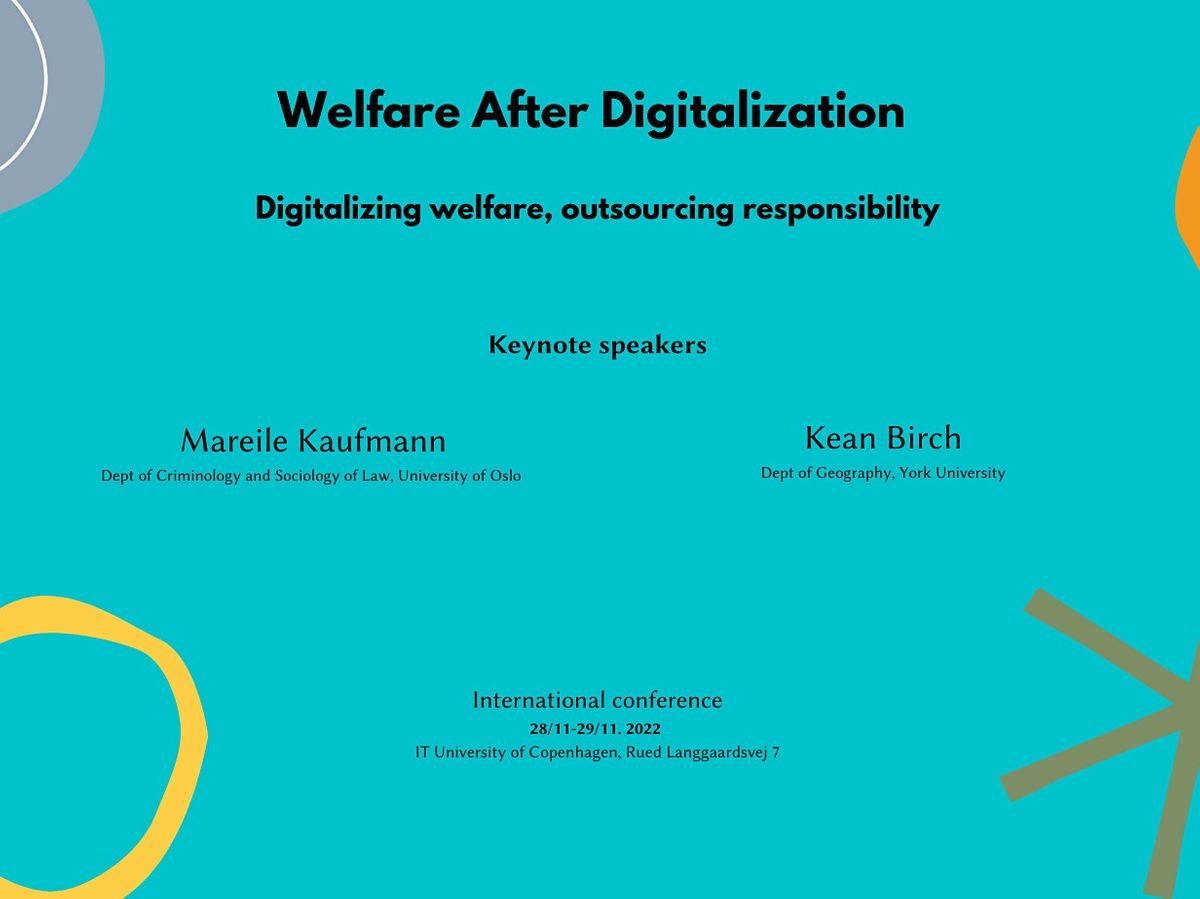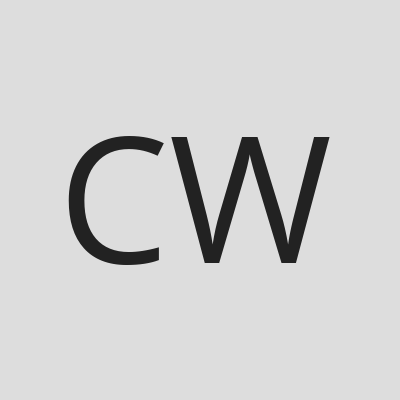
About this Event
During the conference we will take stock of digitalization efforts in the public sector using responsibility as our lens for understanding and intervening in current efforts. Bringing together decision-makers, interest organizations, NGOs, citizens, journalists, educators, and researchers the conference will form a meeting place for exchange of insights and opinions regarding the disparate intentions and varied effects of digitalizing welfare. The goal is to better understand what welfare has become now, after the digitalization of key functions have taken place. In particular, we are interested in the digitalization of four key welfare sectors: education, energy, health care, and law enforcement, but presentations of studies or interventions beyond these sectors are welcome, too (e.g. news media, child care, protection of labor rights, migration and asylum management etc.).
We propose to focus on the outsourcing of responsibility to address a salient feature following public sector digitalization: Public sector digitalization in most cases involves private businesses, either as in-house consultants or as owners of a platform. This differs from traditional forms of Public-Private-Partnerships as an important element is to delegate responsibility to new actors, including citizens. This tendency raises questions about ownership, both with respect to the provided expertise or technical infrastructure as well as in relation to the data that is created, transported, and stored. What happens when the responsibility for welfare services is outsourced? We invite case studies, historical perspectives, first-hand experiences, ethnographies, political manifestos, digital methods and more.
The conference is unique in that we strive for dialogue and joint presentations to share knowledge across practices and worlds that are often separate. We invite presenters to share research, experiences, and politics individually or as a group. This way we wish to make space for conversations and exchange insights between people who occupy very different positions in relation to digitalization programs and their effects.
Combining well-known conference formats like paper presentations and roundtable debate with researcher-cum-interlocutor presentations, the conference will articulate in the broadest possible sense what digitalization does to welfare - and the other way around. Prior to the conference a collection of essays exploring different styles of understanding and writing about welfare in a digitized context will be made. The collection will made available for the participants prior to the conference and launched during the conference. It will work as a shared point of departure for reflection and debate.
Keynote speakers:
Mareile Kaufmann (28th, first day keynote)
“Making Data Matter. When data, tools and humans meet in the name of law enforcement”
Mareile Kaufmann is an Associate Professor at the Department of Criminology and Sociology of Law, University of Oslo , where she seeks to consolidate the field of digital criminology. In her work on data and surveillance practices she combines theory with innovative angles and strong empirical components, interviewing and collaborating with intelligence officers, state officials, software developers and algorithm designers, as well as social media users who were exposed to terror attacks, hackers, artists and children. She has worked on numerous European research projects. Her most recent project Digital DNA was selected for funding under the ERC Starting Grant scheme and in 2019 she received the Young Researcher Talent Grant from the Research Council of Norway. She has consulted the Norwegian Data Protection Commission, the Norwegian Biotechnology Advisory Board and serves on the Editorial Board of Qualitative Research.
Kean Birch (29th, second day keynote)
"The Strange Futures of Digital Assetization?"
Kean Birch is an Associate Professor in the Graduate Program in Science and Technology Studies and Faculty of Environmental and Urban Change at York University, Canada, interested in the changing political economy of scientific research, technology, innovation, and the environment. He draws on a range of perspectives from economic geography, science and technology studies (STS), and economic sociology in order to understand how contemporary, technoscientific economies and societies are evolving and what this means for their citizens. His current research focuses on the processes of assetization and rentiership of concepts that vary from data to knowledge and loyalty. His most recent book is an edited volume with Fabian Muniesa called Assetization: Turning Things into Assets in Technoscientific Capitalism (MIT Press).
Topics of interest
- Welfare governance with a special focus on data
- Use and non-use of ICTs
- Demoing and prototyping
- Sustainable digital infrastructures
- Digital equality, in- and exclusion
- Lived experiences of digitalized welfare systems
- Making things valuable
- Pandemic management and responsabilization
- Privacy of data in a digitalized welfare society
- From public goods to digital outsourced services
Types of presentations
It is possible to apply with a proposal for a paper presentation, a presentation by a research group or a poster. The conference language is English.
• Paper presentations are 15-minute presentations based on original research.
• Research group presentations are 20-minute presentations by a group of researchers working together.
• Researcher-cum-interlocutor presentations
As part of the conference there will be a public debate, which will also be streamed for a wider audience.
Organizers - ‘Welfare after Digitalization’ (WaD), Velux Core Group
The aim of Welfare after Digitalization is to investigate how institutional values, digital affordances, and organizational politics are imagined and embedded in digital welfare services, as well as experienced and practiced by citizens, public servants, and developers of digital infrastructures across the public sector in Denmark. The project runs from 2020-23 and is funded by the Velux Foundations.
WaD does research on how transparent and accountable welfare institutions come into being in practice.
The research questions posed by WaD are:
1. What does welfare mean after digitalization and how is it enacted in key sites (law enforcement, healthcare, local municipal government, and the public schools)?
2. How is public participation and scrutiny in the procurement, implementation and use of digital infrastructures ensured when public and private actors are collaborating at these sites?
3. What values, politics and affordances are embedded in digital solutions, and how are these negotiated and transformed after implementation?
4. Can significant changes be identified in who/what has authority in a digitalized welfare state, and might there be other implicated, or even silent, actors?
Application process
The application must include the following:
• Relevant and complete title
• Indication of type of presentation (individual or group)
• Full name, affiliations, country of residence, and email of corresponding presenter
• Full name and indication of all presenters’ disciplinary backgrounds and affiliations
• Research abstract (150-300 words) indicating: research objectives, methodology, findings, future scope, and 3-5 key words (pdf)
Please submit your application no later than August 1st, 2022, at 12.00 pm CEST/UTC+2 to [email protected]
The proposals will go through peer-review and answers will be sent out appx. six weeks after the application deadline. The abstracts are evaluated on the basis of:
• Originality
• Scholarly quality
• Relevance to the conference themes and topics
• Disciplinary and geographical variation among presentations
• Collaboration
Our ambition is to publish an edited volume based on contributions/papers presented during the conference. Those who do not wish their work to appear in a potential edited volume should so indicate on the abstract. We will accept conference papers of all lengths and styles, but chapters in conference volumes are generally limited to about 5,000 words.
Practical information
There is no conference fee. The conference includes refreshments during breaks, and it is possible to buy lunch on-site.
We welcome geographical breadth. Non-European scholars may choose to present online if preferred. If you prefer to present online, please state this in the application form.
Contact
Questions about the conference, project or application process should be addressed to Vasilis Galis at [email protected]
Event Venue & Nearby Stays
IT University of Copenhagen, 7 Rued Langgaards Vej, Copenhagen , Denmark
USD 0.00
